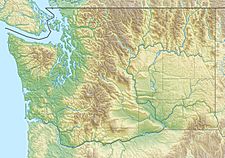Buckner Glacier facts for kids
Quick facts for kids Buckner Glacier |
|
|---|---|
| Type | Mountain glacier |
| Location | North Cascades National Park, Chelan County, Washington, U.S. |
| Coordinates | 48°29′11″N 120°59′37″W / 48.48639°N 120.99361°W |
| Length | .70 mi (1.13 km) |
| Terminus | Icefall |
| Status | Retreating |
Buckner Glacier is a fascinating ice formation found on the south side of Buckner Mountain. It's located deep within North Cascades National Park in the U.S. state of Washington. This glacier is about .70 mi (1.13 km) (just over a kilometer) long. What makes it unique is that it's split into two main parts along its path. The upper part sits at a higher elevation, while the lower part is further down the mountain.
Contents
What is a Glacier?
A glacier is like a giant, slow-moving river made of ice. It forms over many years as snow piles up, gets compressed, and turns into ice. Glaciers move very slowly due to their immense weight and gravity. They can carve out valleys and shape mountains over thousands of years.
How Glaciers Form
Glaciers need special conditions to form:
- Lots of snow: More snow must fall in winter than melts in summer.
- Cold temperatures: The climate must be cold enough for snow to stay frozen.
- Time: It takes a very long time for snow to compact into dense glacial ice.
As new snow falls, it presses down on the snow below. This pressure squeezes out air, turning the fluffy snow into granular ice, then into a denser form called firn, and finally into solid glacial ice.
Buckner Glacier's Location and Size
Buckner Glacier is nestled in the rugged North Cascades National Park, a beautiful area known for its many glaciers and tall peaks. It's found specifically in Chelan County, Washington.
High Up on Buckner Mountain
The glacier is situated on the south slope of Buckner Mountain. This mountain is quite tall, reaching elevations of over 9,000 feet (2,700 meters). The glacier itself starts high up and flows downwards.
Two Sections of Ice
Buckner Glacier is unique because it's divided into two main sections:
- Upper section: This part is higher up, between about 8,400 ft (2,600 m) (2,560 meters) and 7,500 ft (2,300 m) (2,286 meters).
- Lower section: This part is further down the mountain, from about 6,800 ft (2,100 m) (2,073 meters) to 6,300 ft (1,900 m) (1,920 meters).
This split often happens when a glacier flows over a steep cliff or a rocky area, causing the ice to break apart.
Nearby Glaciers
Buckner Mountain is located between Buckner Glacier and a much larger glacier called Boston Glacier. Boston Glacier is to the north of Buckner Mountain. The North Cascades are home to more glaciers than any other area in the lower 48 U.S. states.
The Retreating Glacier
The status of Buckner Glacier is listed as "retreating." This means the glacier is shrinking in size. When a glacier retreats, it means that more ice is melting or breaking off than is being added by new snowfall.
Why Glaciers Retreat
Glaciers around the world are retreating due to changes in climate. Warmer temperatures cause more ice to melt, and sometimes there's less snowfall to replenish the ice. Scientists study glaciers like Buckner Glacier to understand how our planet's climate is changing.
Importance of Glaciers
Glaciers are very important for several reasons:
- Freshwater source: They store vast amounts of freshwater, which can melt and provide water for rivers and streams, especially in dry seasons.
- Climate indicators: Their size and movement can tell scientists a lot about long-term climate patterns.
- Ecosystems: They create unique habitats for plants and animals.
Studying Buckner Glacier helps us learn more about these amazing natural ice formations and the changes happening in our environment.
 | Valerie Thomas |
 | Frederick McKinley Jones |
 | George Edward Alcorn Jr. |
 | Thomas Mensah |


